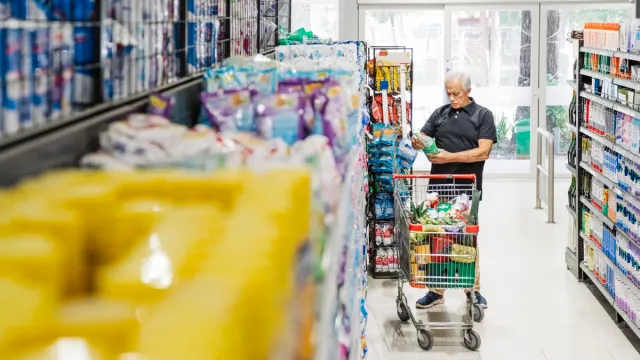Dollar Stores Are Secretly Charging You More Than Walmart and Target, Experts Warn

With inflation stubbornly high, many of us regularly shop at dollar stores, hoping to cut down on costs for everyday essentials. But while chains such as Dollar General and Dollar Tree are still managing to offer lower prices than retailers like Walmart or Target, experts warn that they are actually charging you more through one secret strategy: shrinkflation.
RELATED: The 9 Worst Things to Buy at Dollar Tree.
Coined by British economist Pippa Malmgren in 2009, shrinkflation is a term that describes the “process of reducing the size or quantity of product while the price of product remains the same or slightly increases,” according to the Corporate Finance Institute (CFI). Basically, it’s a hidden form of inflation that retailers use to try to pass higher costs onto customers in a less noticeable way.
“Instead of increasing the price of a product, something that would be immediately evident to consumers, producers reduce the size of the product while maintaining the same price,” the experts at CFI explain. “The absolute price of the product doesn’t go up, but the price per unit of weight or volume has increased. The small reduction in quantity is usually unnoticed by consumers.”
A Dec. 2023 report from Senator Bob Casey indicates that shrinkflation has become a more common practice in recent years, “with about 10 percent of inflation being driven solely by shrinkflation.” As a result, household paper products such as toilet paper and paper towels are 34.9 percent more expensive than they were in Jan. 2019, while snacks like Oreos and Doritos are 26.4 percent more expensive.
But it seems that some retailers are utilizing this strategy more than others. Dollar stores such as Dollar General and Dollar Tree are secretly charging customers more in the long run for essentials such as toilet paper, soap, and groceries through shrinkflation, Fortune reported on Feb. 12.
According to the business magazine, these items cost more per unit price at dollar stores than they do at other large retailers. For instance, a six-pack of 3.17-ounce bars of Dove sensitive soap costs $8 at Dollar General, but an eight-pack of the soap in 3.75-ounce bars costs $10.99 at Target. So the cost per ounce of soap is about five cents less at Target compared to Dollar General, despite the seemingly higher price tag.
RELATED: These Are the Products You “Need to Stop Buying” at Dollar Tree, Shopper Says.
Even this small difference makes a big impact for retailers, Fortune explained. In 2023, Dollar General and Dollar Tree both ended up with profit margins of around 31.5 percent—which was 7 percent higher than Walmart. Brian Numainville, principal of retail consulting at The Feedback Group, told the magazine that dollar stores are keeping their profit margins wide by using shrinkflation to create the illusion of a good deal instead of more obviously raising prices and alienating customers.
“That doesn’t mean, however, that shoppers won’t notice that they are getting less for their money even without obvious price hikes,” Numainville said.
In fact, customers are becoming more aware of this sneaky practice. A Dec. 2022 Reddit post flagged “Dollar Tree shrinkflation” by showing a four-pack of Fruit Roll-Ups that had been reduced to a three-pack. “And likely cheaper for more at Walmart,” one person replied in the comment section. “Dollar Tree is almost always a ripoff when you check the per ounce price.”
A 2023 YouGov survey also found that 73 percent of consumers in the U.S. are concerned about shrinkflation. These consumers cited “snack foods (e.g. crisps, confectionary items, nuts, etc.)” and “dry goods (e.g. cereals, flour, sugar, pasta, rice, etc.)” as the categories where they notice the tactic most.
Best Life has reached out to both Dollar General and Dollar Tree about accusations of shrinkflation in their stores, and we will update this story with their response.
But when Fortune reached out, Dollar General did defend its practices amid inflation. “For more than eight decades and through a variety of macroeconomic environments, Dollar General has served millions of Americans seeking to stretch their budgets on household essentials in a convenient, easy-to-shop store,” a Dollar General spokesperson told the magazine. “We continually partner with our national and private brand suppliers to evaluate how best to offer items that meet our customers’ product and affordability needs.”